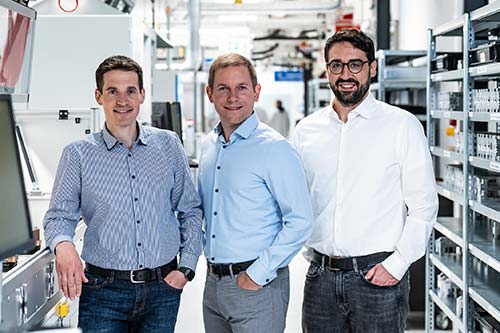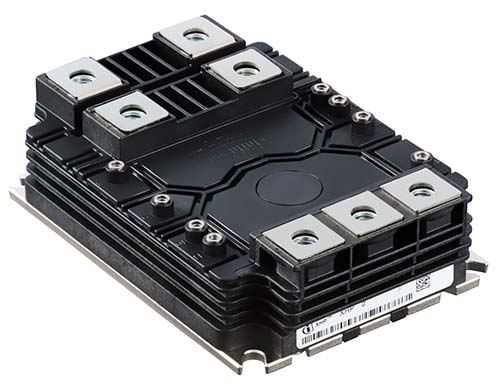
The team around Dr. Konrad Schraml (center), Dr. Caspar Leendertz (right, both Infineon) and Prof. Dr. Thomas Basler (TU Chemnitz) brought the 3300V CoolSiC XHP2 high-performance module to production maturity.
Infineon Technologies AG has been nominated for the Deutscher Zukunftspreis 2024, the Federal President’s Award for Technology and Innovation, for its development of a new type of energy-saving chip based on the innovative semiconductor material silicon carbide (SiC). The Jury of Deutscher Zukunftspreis has announced the three nominated teams today in Munich. A team of developers from Infineon, together with Chemnitz University of Technology, has succeeded in developing the world’s first silicon carbide MOSFET with a vertical channel (trench MOSFET) and innovative copper contacting in the 3300V voltage class. The new SiC modules and the power converters equipped with the modules represent a revolutionary innovation leap in semiconductor technology from conventional silicon to more energy-efficient silicon carbide, which reduces switching losses in high-current applications by 90 percent.
MOSFETs are electrical switches for a wide range of applications. Trench MOSFETs differ from so-called planar MOSFETs in their cell structure and performance. While the current flow in planar MOSFETs is initially horizontal, trench MOSFETs offer purely vertical channels. This results in a higher cell density per surface area, which in turn significantly reduces the losses in the chip during energy conversion and therefore increases efficiency.
“The transition towards green energy and many other pressing challenges of our time can only be solved with technological progress,” said Jochen Hanebeck, CEO of Infineon Technologies AG. “It is therefore important to promote and reward innovation and make it visible in society. The ‘Deutscher Zukunftspreis’ is the most important national award that is presented with this aim in mind. The nomination is a great honor for us and proof of the successful research and development work at Infineon. Congratulations to all colleagues involved!”

The newly developed CoolSiC™ XHP™2 module family enables significant energy savings, for example in industrial power generation in solar parks or wind turbines
The CoolSiC™ XHP™2 module family enables significant energy savings, for example in industrial power generation in solar parks or wind turbines, in power transmission and, above all, in end consumption, where high energies in the megawatt range are required. A single train with a silicon carbide drive system can save around 300 MWh per year compared to the previous silicon-based solution. This is roughly equivalent to the annual consumption of 100 single-family homes. Together with drive technology manufacturers and rail operators, Infineon is making an important contribution to decarbonization. At the same time, local residents also benefit from the lower noise level of trains with SiC modules when they pass through residential areas.
Through numerous innovative developments in chip processing and design as well as contacting and module technology, the team led by Dr. Konrad Schraml, Dr. Caspar Leendertz (both Infineon) and Prof. Dr. Thomas Basler (Chemnitz University of Technology) has brought the 3300V CoolSiC XHP2 high-performance module to production readiness. With ten times greater reliability against thermomechanical stress and a significantly higher power density compared to silicon modules, the new silicon carbide module can also be used to electrify large drives in diesel locomotives, agricultural and construction machinery, aircraft and ships, which were previously reserved for fossil fuels. The significantly higher switching frequencies permitted by the new module are helpful, as they enable a significant reduction in weight and volume of the power converters in the application.
“This nomination shows that climate change and sustainable resource consumption have become central aspects of our society,” said Dr. Peter Wawer, Division President Green Industrial Power (GIP) at Infineon. “Innovative energy solutions and power semiconductors are a core component in decarbonization and fighting climate change, as the expert jury of Deutscher Zukunftspreis has recognized. I am proud that we at Infineon can make a significant contribution to a green future with pioneering technology.”
Project manager Dr. Konrad Schraml: “For us as a development team, it is a matter close to our hearts to develop innovative chips that contribute to efficient energy consumption and thus also to green mobility on our planet. This nomination is a great recognition for my team, whose tireless efforts, expertise and passion for sustainability have made the technology breakthrough in silicon carbide possible.”
On November 27, Federal President Frank-Walter Steinmeier presents the Deutscher Zukunftspreis to the winning team in Berlin.
Find more technical details about the CoolSiC™ XHP™2 module family here.


